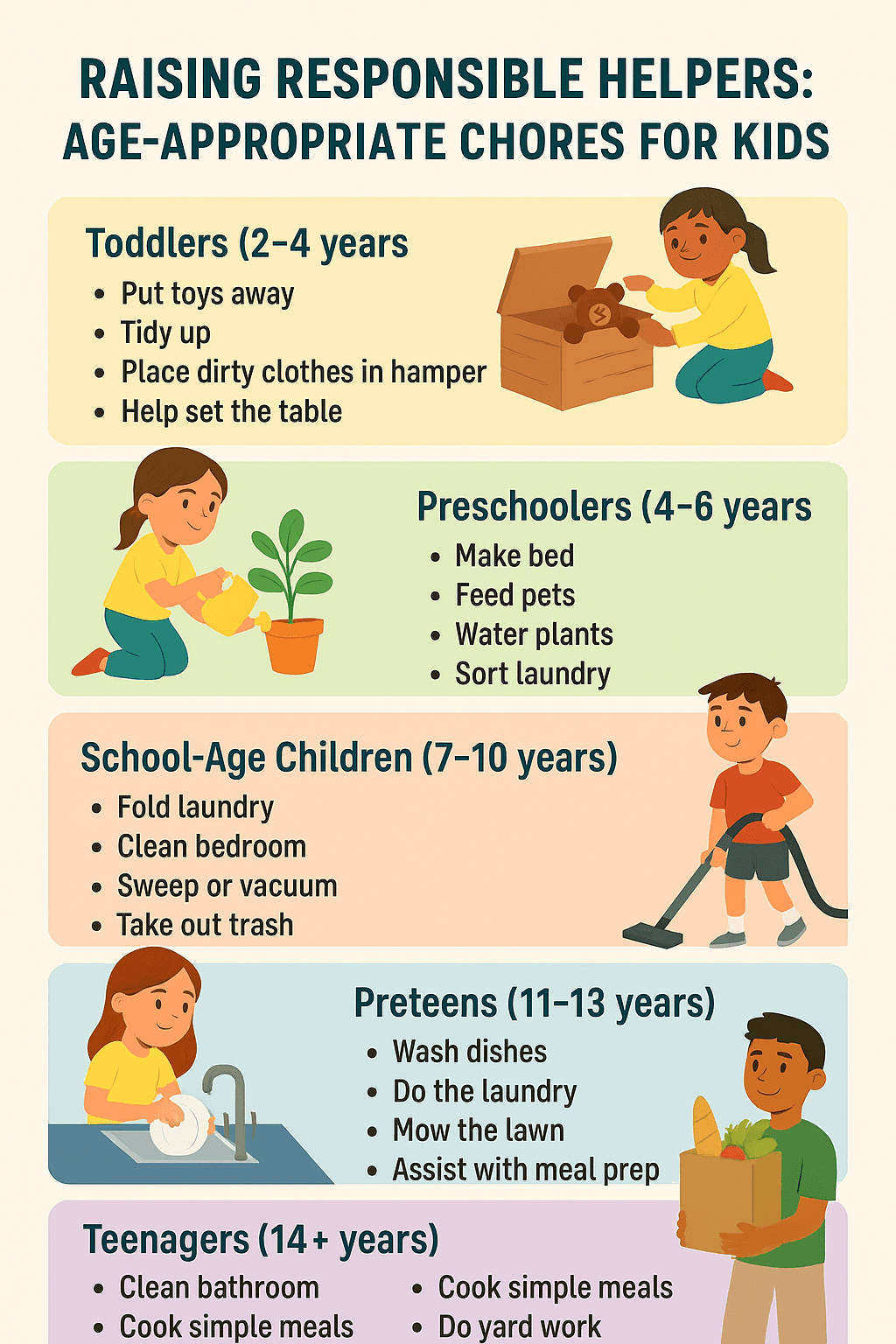
🧹 Raising Responsible Helpers: Age-Appropriate Chores for Kids
Share
🎯 Introduction: Building Responsibility from an Early Age
Teaching children the value of responsibility lays the foundation for lifelong personal growth, independence, and teamwork. One of the best ways to nurture these qualities is through age-appropriate chores. In this guide, we'll explore the right tasks for every age group—from toddlers to teenagers—and show how chores can boost self-esteem, life skills, and a strong work ethic.
👶 Toddlers (Ages 2–4): Starting Simple
Even the youngest children can help around the house with easy, playful tasks.
Suggested Chores:
- Put away toys and books
- Place dirty clothes in the laundry basket
- Help set the table
- Tidy up play areas
Tips for Toddlers:
- Keep tasks simple and short
- Turn chores into games (e.g., singing a clean-up song)
- Use clear, simple instructions
- Praise efforts generously, not just results
Important: Always prioritize safety and supervise closely.
🎨 Preschoolers (Ages 4–6): Building Independence
Preschoolers love feeling capable. Give them slightly more complex tasks to boost confidence.
Suggested Chores:
- Make the bed (simple version)
- Feed pets
- Water plants
- Sort laundry by color
- Help prepare simple snacks
- Light cleaning (dusting, wiping surfaces)
Tips for Preschoolers:
- Break tasks into clear, manageable steps
- Allow choice between a few chores
- Create a consistent chore routine
- Celebrate small successes
🏡 School-Age Children (Ages 7–10): Taking on Real Responsibilities
School-age kids are ready for a wider range of household contributions.
Suggested Chores:
- Clean and organize their bedroom
- Fold and put away laundry
- Sweep, mop, or vacuum
- Empty small trash bins
- Assist with meal prep under supervision
- Help with light gardening tasks
Tips for School-Age Kids:
- Rotate chores to teach versatility
- Introduce planning and scheduling tasks
- Encourage pride and ownership in their work
🔧 Preteens (Ages 11–13): Growing Independence and Skills
Preteens are ready to handle more complex and independent chores.
Suggested Chores:
- Wash dishes or load dishwasher
- Do laundry with supervision
- Help with grocery shopping and meal planning
- Organize personal spaces and declutter
- Mow the lawn (if safe)
- Babysit younger siblings briefly (depending on maturity)
Tips for Preteens:
- Foster decision-making and problem-solving skills
- Introduce basic money management through allowances
- Guide them in taking full ownership of tasks
- Engage them in family projects or home improvement tasks
🏠 Teenagers (Ages 14+): Preparing for Real-World Independence
Teenagers should practice managing real-world tasks to prepare for adulthood.
Suggested Chores:
- Deep clean rooms and common areas
- Manage personal laundry and ironing
- Plan and cook simple meals
- Grocery shop with a budget
- Handle pet care responsibilities
- Assist with home maintenance and minor repairs
Tips for Teenagers:
- Encourage independence in task planning
- Teach financial literacy and budgeting
- Promote community involvement and volunteering
- Develop leadership skills through mentoring younger siblings
- Express trust and appreciation for their growing maturity
🌟 Conclusion: Chores as a Tool for Growth
Age-appropriate chores teach children much more than cleaning skills—they build responsibility, self-confidence, teamwork, and life skills. With guidance, encouragement, and patience, chores can transform into powerful growth experiences for every child.
By raising responsible helpers today, you're empowering independent, capable adults for tomorrow. Let chores be a celebration of growth—not a battle—and watch your children's pride in their abilities soar!
